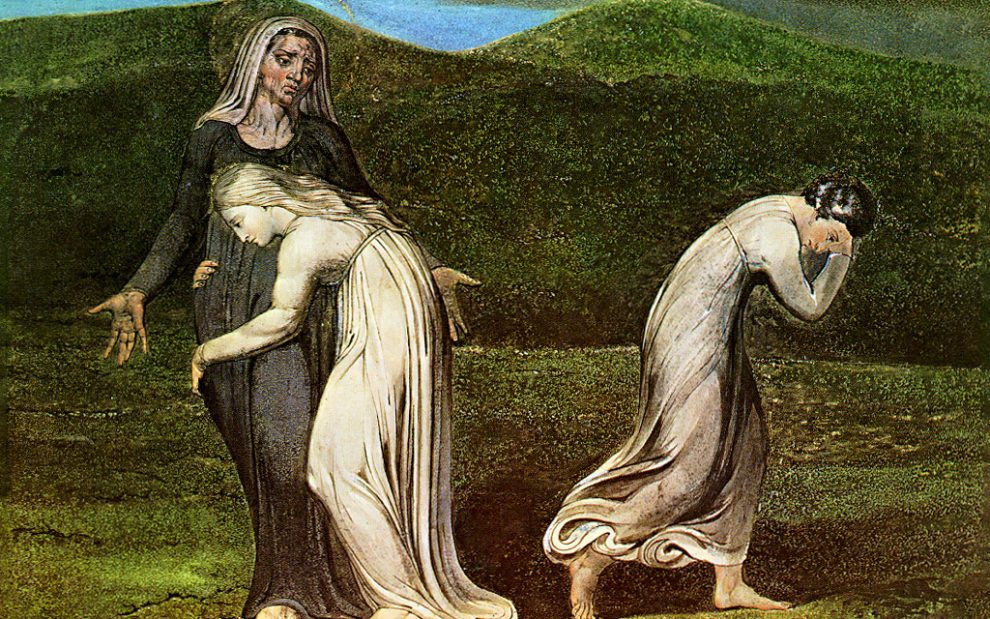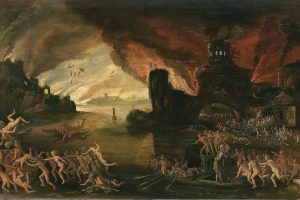I am not the most bible-literate minister. I can’t rattle off many verses by heart; I am living proof of the old joke that Catholics don’t often read their Bible. Even so, by the time I got to college and was in the process of coming out, I had a painful awareness of what are commonly known as the “clobber passages,” those verses that are often wielded against LGBTQ folks. From Leviticus to Paul’s letters, there are passages that still make me sink down in my pew when read from the pulpit. They make me feel small and out of place, like the Bible is not really for me.
As I made my way through scripture post coming out, I was searching for stories and characters who made my sacred book feel more welcoming. Researcher Rudine Sims Bishop coined the phrase “windows, mirrors, and sliding glass doors” to explain what a book can be. It can be a window into an experience unlike ours, it can invite us to step through the sliding glass door into that world, or it can be a mirror that reflects something of our own experience back at us. Through some styles of prayer, we are invited to imagine ourselves in scenes and moments recorded in the Bible, like a sliding door. The Bible is most often a window into experiences vastly different than my own, whether it is those of the figures recorded or the writers who recorded them. But for the Bible to be more meaningful and relevant to my life as a queer woman in 2023, I needed to find some mirrors that reflected something of my reality back to me.
When I approached the Bible with a queer lens, the first chapter of the book of Ruth becomes even more meaningful. Ruth had been married to Naomi’s son, who had died, and under the laws of Israel, Ruth was free to leave. She could go and remarry and not worry about her future anymore. Notably, widows were so marginalized and unprotected in the ancient world that the Israelites were particularly obligated to care for them by name. Ruth can, and was encouraged, to leave Naomi to secure a better future for herself. But Ruth refuses, vowing:
“Do not press me to leave you or to turn back from following you!
Where you go, I will go; where you lodge, I will lodge;
your people shall be my people, and your God my God.
Where you die, I will die—there will I be buried.
May the Lord do thus and so to me, and more as well,
if even death parts me from you!” (Ruth 1:16-17).
Ruth’s vow to Naomi is one she makes of her own free will, when they have no more obligations to each other. No laws bind them together, so Ruth makes her own covenant with Naomi. Ruth, a Moabite and outsider to Israel, has joined God’s chosen people by her own promise of love and care. With a queer reading of the text, Ruth and Naomi’s bond can be viewed as that of chosen family.
“Chosen family” is a term used often by queer folks to describe a family that is chosen, beyond the one we are born into. A chosen family means varied things to various people. For some, this family may be formed when their family of origin has not welcomed or accepted them; for others a chosen family might be an additional support alongside their family of origin. It is a community, built with queer and non-queer folks, making covenantal promises of love and support like Ruth’s, without having legal ties to one another.
Another covenantal relationship arises in the story of David and Jonathan. “The soul of Jonathan was bound to the soul of David, and Jonathan loved him as his own soul” (1 Sam. 18:1). In his eulogy for Jonathan, David says, “greatly beloved were you to me; your love to me was wonderful, passing the love of women” (2 Sam. 1:26).
If you are a queer person and looking to see you and your partner reflected in scripture, these passages are probably the most exciting, the most consoling. While there is scholarly debate and ambiguity surrounding the exact nature of their relationship, these verses show David identifying Jonathan as the most important person in his life. With a queer lens, that is easily seen as a romantic relationship. And David, like Ruth, is part of Jesus’s family tree. He is a king beloved by the Israelites, a shepherd chosen by God, and considered the author of many of the Psalms. David and Jonathan are central figures in the story of salvation that is scripture, not afterthoughts or side characters.
When I think of central figures in scripture, I am always pointed right to the gospels. In the apostles I find a community who left their families of origins to travel together and who were so profoundly transformed by their travels with Jesus. John records the call of the first two disciples as follows:
“They came and saw where [Jesus] was staying, and they remained with him that day. It was about four o’clock in the afternoon. One of the two who heard John speak and followed him was Andrew, Simon Peter’s brother. He first found his brother Simon and said to him, ‘We have found the Messiah’ (which is translated Anointed). He brought Simon to Jesus, who looked at him and said, ‘You are Simon son of John. You are to be called Cephas’ (which is translated Peter)” (John 1:39-42).
I imagine Peter attempting to go back to his old neighborhood and needing to explain that he has a new name now. His old friends and neighbors might be confused that he doesn’t go by Simon anymore. Peter reminds me of all the wonderful transgender young people I have worked with, how full of joy they are when they find a new name that works for who they know themselves to be. Peter, our first pope, as well as Abraham, Sarah, and Paul can be a mirror for them.
These scripture stories serve as necessary mirrors for me and other folks in the queer community that remind us we are part of God’s story of salvation and beloved exactly as we are. I feel empowered to bring my full self to scripture. And for non-queer folks, approaching scripture with a queer lens can allow them a window into what being a queer person of faith is like. But I didn’t find the mirrors on my own. It was a dear friend who first pointed out Ruth and Naomi as a chosen family. It was in working with faith-filled young trans folks that I saw the many stories of name changes in the Bible in a queerer way.
Whenever I am discouraged by what seem like incessant quotations of clobber passages that prop up homophobia and transphobia in my church, I am reminded that scripture is for all of us to bring the fullness of our lived experiences to, however different our experiences might be. It’s there to help all of us continually grow in love of God and neighbor. It gives us mirrors to be empowered and affirmed, windows that build empathy and understanding of others, and invites us to walk through the door and place ourselves in the stories, and closer to God.
Image: Wikimedia Commons/ Naomi entreating Ruth and Orpah in the land of Moab, William Blake, 1795
















Add comment